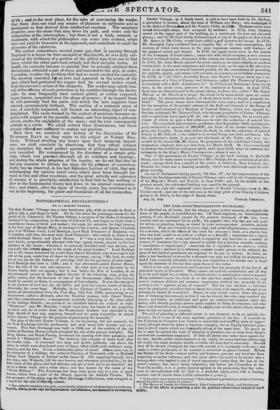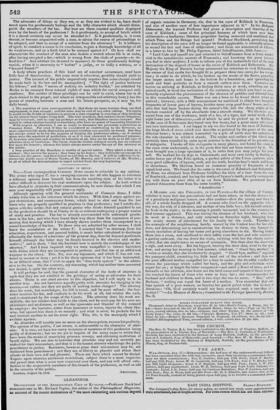THE BAR—SOME:: 4 REFORDIATION NECESSARY.
Pr is admitted on all hands, that the charges upon justice amount, as regards the mass of the people, to a prohibitory tax. Of these expenses, no inconsiderable portion, if not absolutely caused by the present monopoly of the bar, %Yeses created and are continued for its profit; the popular idea, that fees are only path} for advice or pleading, being, as stated by your correspondent Aristides, grossly incorrect. They are extorted at every stage, and under all pretences,—sometimes for a motion, which the officer of the court, the attorney's clerk, or a charity boy, who can read, could do as well as a Gibbs or a Hominy; - sometimes for a signa- ture to a paper never read, and which is signed by any barrister as a matter of course; * sometimes for a sign manual to certify that a petition contains nothing " scandalous or impertinent ;" sometimes for a signature to an answer ; whilst to vouch that a petition for a rehearing contains matter proper to be reheard, the. pens of two learned gentlemen are required to be put in motion. In short, nog plea is too barefaced to serve for a demand—no sum too trifling for acceptance ; and if I am correctly informed, in every new regulation a far keener eye is kept upon the interests of the bar than upon those of the suitor. Pr is admitted on all hands, that the charges upon justice amount, as regards the mass of the people, to a prohibitory tax. Of these expenses, no inconsiderable portion, if not absolutely caused by the present monopoly of the bar, %Yeses created and are continued for its profit; the popular idea, that fees are only path} for advice or pleading, being, as stated by your correspondent Aristides, grossly incorrect. They are extorted at every stage, and under all pretences,—sometimes for a motion, which the officer of the court, the attorney's clerk, or a charity boy, who can read, could do as well as a Gibbs or a Hominy; - sometimes for a signa- ture to a paper never read, and which is signed by any barrister as a matter of course; * sometimes for a sign manual to certify that a petition contains nothing " scandalous or impertinent ;" sometimes for a signature to an answer ; whilst to vouch that a petition for a rehearing contains matter proper to be reheard, the. pens of two learned gentlemen are required to be put in motion. In short, nog plea is too barefaced to serve for a demand—no sum too trifling for acceptance ; and if I am correctly informed, in every new regulation a far keener eye is kept upon the interests of the bar than upon those of the suitor.
But it is not only previous to entering court that the monopoly of the bar is of practical injury to the suitor. Many causes arc entirely undefended, and all that is to be said might be, or rather is, written down—a mouth-piece alone is wantsdt Many defended causes too, both as to law and fact, might be conducted by aay man of common abilities and common experience, without the necessity of re- sorting to the " superior advice of counsel." But the law declares a barrister must he employed, yet allows him to desert his client with impunity, though if an attorney be absent lie is melded. Hence, in very trivial causes, arises the pray tice of retaining two counsel, so that if one be absent, the other may conduct the cause; and hence an additional and quite an unnecessary expense upon the. suitor, who already payinga person quite capable of doing his business, and who dares not desert his post, is compelled to employ one or two others whose attend- ance he has no means of insuring.
The evil of pleading in different courts is not, however, to be so quickly dis- missed ; for it is one of the most injurious practices at the bar.. A counsel ire the Criminal or Common Law Courts is somewhat restricteft by want of oppor- tunity (though there the abuse is injurious enough), but an Equity barrister prac- tises in five courts which are frequently sitting at the same time. To guard as far as may he against the want of ubiquity in pleaders, two or even more King's counsel are sometimes employed. If they all attend, the suitor has a speech for his fee; but the public inconvenience is not slight, for every barrister addressing
the court, the cause occupies double or treble the time that is necessary. Shoula they all be absent, (it may be the case with several, it is constantly with one,) the cause is either postponed, or its conduct is intrusted to junior counsel. Before the Master of the Rolls—whose ability and firmness prevent any barrister from acquiring an undue influence, and who never allows his court to be turned, into a bear-sarden—this neglect is not of much importance (other than the loss of the suitor-'s money, fees never being returned); but before the Chancellor, or the Vice-Chancellor, it is a pretty general opinion in the profession, that the influ- ence of one individual will be fatal to a doubtful cause, even with a leading counsel, and of course there is little chance for a junior.: * It has been most properly obsersed, " that whatever Is granted as a matter of course, should be taken as a matter of course."
t The House of Lords, the Chancellor's, Vice-Chancellor's, Rolls, and Exchequer. One of the effects of promoting it men for political subserviency instead of 'eget
The advocates of things as they are, or as they are wished to be, have dwelt much upon the gentlemanly feelings and the lofty character which should distin- guish the members of the bar. But how are these vaunted qualities displayed even by the heads of the profession ? Is it gentlemanly, to accept of briefs which it is a moral certainty can never be attended to? Is it gentlemanly, is it even decent, to become acquainted with a case, to advise the course of proceedings to be adopted, and then to accept of a retainer from the adversary ? Is it loftiness of spirit, to conduct a cause to its conclusion, to gain a thorough knowledge of all its weaknesses, and on a fresh trial to he arrayed against it ? Or how shall we characterize the conduct of the man who deserts a wretch whose life is at stake, after having accepted a fee—which is wrung from the vitals of poverty—to de- fend him ? And whither (to descend to manners) do those gentlemanly feelings vanish, when it is necessary to " bother" a judge, or to bully a witness, or a "learned friend ?"
A body where practices of this kind are of constant occurrence, need have little fear of deterioration. But even were it otherwise, gentility should yield to justice. The interest of the public imperatively requires that some change should be made both in the law and its monopolies.§ " The right of justice between his fellows," and the "means of making his industry fruitful," are admitted by Burke to be amongst those natural rights of man which the social compact only confirms. But neither of these privileges can be said to exist, where law is de jiteto denied to the people, and where an irresponsible and arbitrary body H has the power of standing between a man and his future prospects, or, it may be, his § The assertion of your correspondent C., that there are more lawyers than can find employment, is true enough ; and the same may be said of any other calling. Yet surely it would be the height of injustice to prevent a man engaging in weaving or ship-building on the plea of those trades being dull. The trite assertion, that lawyers create litigation, may be reversed ; and we may say perhaps as truly, that litigation creates lawyers. But admit it—what relation has that to barristers, who have no power of fomenting litigation ?
With respect to attornies, I am as ready to denounce the pecuniary restrictions as Amazon Sense. For even if they be considered as contributing to the Revenue, no more objectionable mode than taxing personal exertion can possibly be found. But they are always stated to he for the purpose of keeping the profession select,—as if money alone were the standard of perfection, or as if it ever answered its professed purpose. If, however, selection and scrutiny he tolerable at all, they are far more so in the case of attornies than of barristers. The client, from the former acting in secret, has no reliance but upon his honour; whereas the latter always moves under the eye of the attorney or the public.
II One practice of the Benchers is worthy of special notice. They admit a man as a student ; they receive his money ; they buoy up his hopes ; they indirectly encourage his labours for fine years; and then refuse to call him to the bar. It will be sufficient to in- stance the public cases of Horne Tooke, of Mr. Harvey, and (I believe) of Mr. Wooler ; in all of which the determination to reject existed from the very beginning.



















 Previous page
Previous page